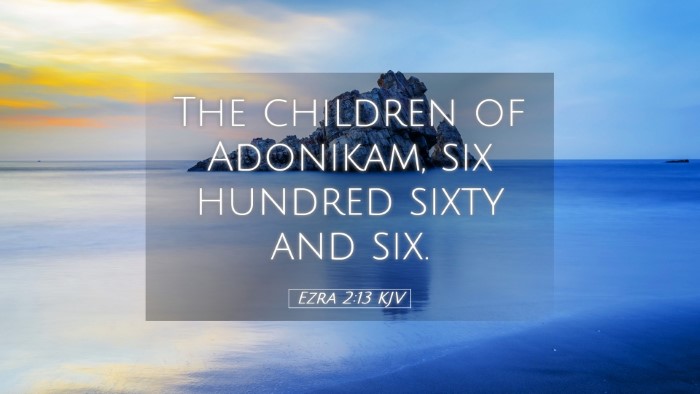Ezra 2:13 - Commentary and Insights
Ezra 2:13 states, "The children of Adonikam, six hundred sixty and six." This verse presents a seemingly simple census figure within the broader narrative of the return from Babylonian captivity. However, it carries significant implications for the understanding of community identity, restoration, heritage, and God’s faithfulness.
Historical Context
The context of Ezra's return involves a restoration of the Jewish community after seventy years of exile in Babylon. The mention of specific families, such as the children of Adonikam, serves to reinforce the idea of continuity of heritage, showcasing those who returned to Jerusalem to rebuild their homeland.
Commentary Insights
- Matthew Henry: Henry emphasizes the importance of genealogy in Israel's history. He notes that the precise numbers listed reflect God’s faithfulness in preserving a remnant among His people. The mention of "six hundred sixty and six" intriguingly echoes biblical numerology, which often carries symbolic meanings.
- Albert Barnes: Barnes observes that the numerical detail indicates a structured return, shedding light on the organization and order among the exiles. The specific mention of families denotes their social structure and the significance of family lineage in Israelite identity. He stresses that God’s providence ensured that not only individuals but entire families were preserved and able to return.
- Adam Clarke: Clarke provides an analytical perspective on the figure itself, suggesting that the number could represent the completeness of the family units returning from exile. He also points out that the "children of Adonikam" symbolizes the restorative work God was doing among His people, unifying them for a common purpose.
Theological Significance
The verse and its focus on a specific family remind readers of God’s faithful covenant relationship with His people. It illustrates that even after a period of judgment and exile, God remembers His promises and restores those who return to Him. This connectivity to ancestry reinforces the idea of corporate identity in faith.
Insights for Modern Application
- Community Restoration: Just as the children of Adonikam returned to rebuild their home, modern congregations should focus on addressing the community’s needs and restoring relationships post-exile—be it spiritual, emotional, or social.
- Value of Heritage: Understanding one’s heritage is crucial for identity formation in faith communities today. Such genealogies remind congregants of their place within the larger story of God’s redemptive plan.
- Importance of Order and Unity: The structured return indicates a God of order. Churches today can draw parallels in valuing unity and structure when engaging in ministry, emphasizing that every member has a contribution to make.
Conclusion
Ezra 2:13, while a simple census entry, is laden with rich theological truths about continuity, heritage, and the importance of community. It serves as an essential reminder of God’s faithfulness through history and His active role in restoration. For pastors, students, theologians, and Bible scholars, the verse opens up a wealth of reflections on identity, continuity, and God’s ongoing work amongst His people.


